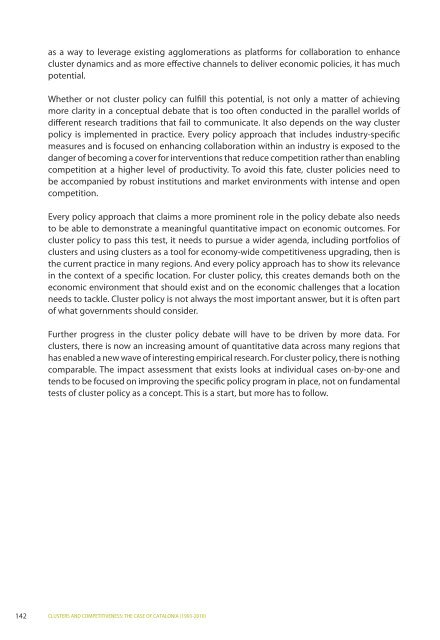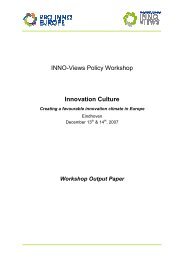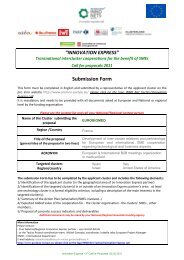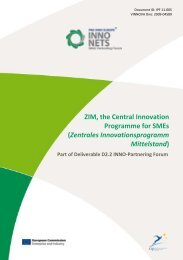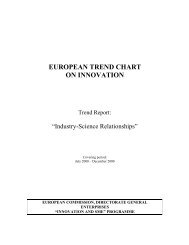Clusters and competitiveness - PRO INNO Europe
Clusters and competitiveness - PRO INNO Europe
Clusters and competitiveness - PRO INNO Europe
You also want an ePaper? Increase the reach of your titles
YUMPU automatically turns print PDFs into web optimized ePapers that Google loves.
as a way to leverage existing agglomerations as platforms for collaboration to enhance<br />
cluster dynamics <strong>and</strong> as more effective channels to deliver economic policies, it has much<br />
potential.<br />
Whether or not cluster policy can fulfill this potential, is not only a matter of achieving<br />
more clarity in a conceptual debate that is too often conducted in the parallel worlds of<br />
different research traditions that fail to communicate. It also depends on the way cluster<br />
policy is implemented in practice. Every policy approach that includes industry-specific<br />
measures <strong>and</strong> is focused on enhancing collaboration within an industry is exposed to the<br />
danger of becoming a cover for interventions that reduce competition rather than enabling<br />
competition at a higher level of productivity. To avoid this fate, cluster policies need to<br />
be accompanied by robust institutions <strong>and</strong> market environments with intense <strong>and</strong> open<br />
competition.<br />
Every policy approach that claims a more prominent role in the policy debate also needs<br />
to be able to demonstrate a meaningful quantitative impact on economic outcomes. For<br />
cluster policy to pass this test, it needs to pursue a wider agenda, including portfolios of<br />
clusters <strong>and</strong> using clusters as a tool for economy-wide <strong>competitiveness</strong> upgrading, then is<br />
the current practice in many regions. And every policy approach has to show its relevance<br />
in the context of a specific location. For cluster policy, this creates dem<strong>and</strong>s both on the<br />
economic environment that should exist <strong>and</strong> on the economic challenges that a location<br />
needs to tackle. Cluster policy is not always the most important answer, but it is often part<br />
of what governments should consider.<br />
Further progress in the cluster policy debate will have to be driven by more data. For<br />
clusters, there is now an increasing amount of quantitative data across many regions that<br />
has enabled a new wave of interesting empirical research. For cluster policy, there is nothing<br />
comparable. The impact assessment that exists looks at individual cases on-by-one <strong>and</strong><br />
tends to be focused on improving the specific policy program in place, not on fundamental<br />
tests of cluster policy as a concept. This is a start, but more has to follow.<br />
142 CLUSTERS AND COMPETITIVENESS: THE CASE OF CATALONIA (1993-2010)


